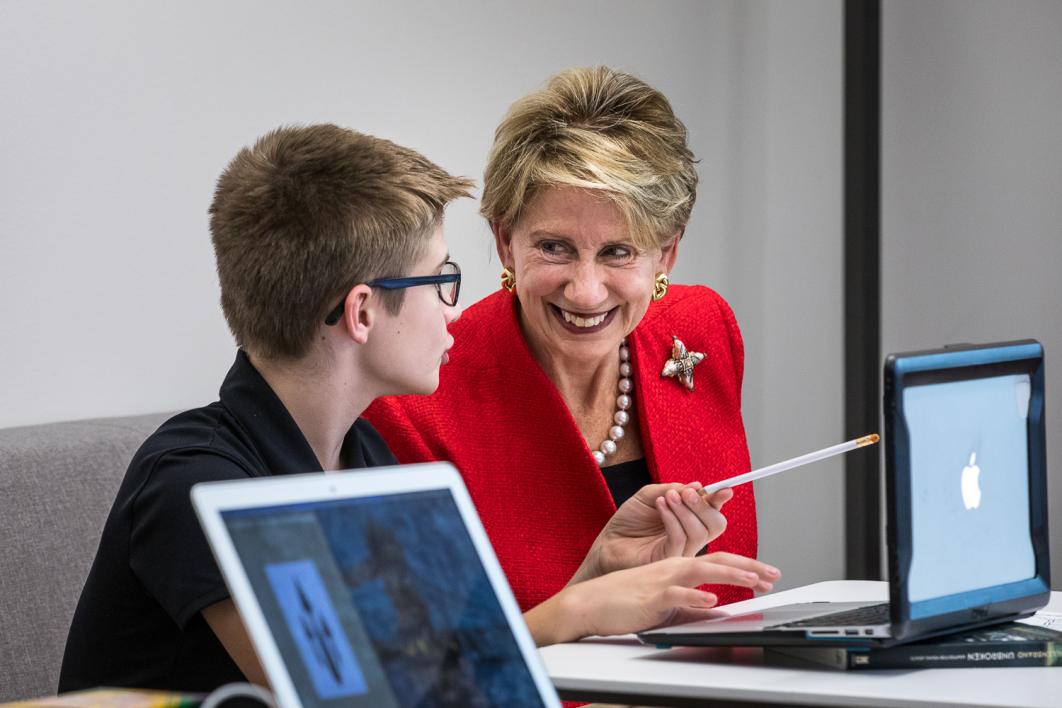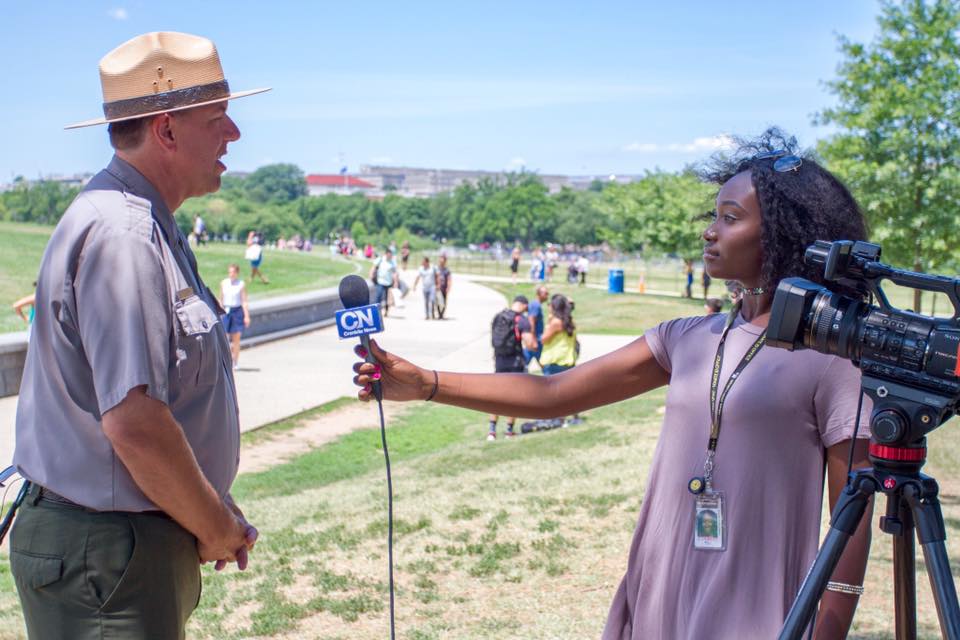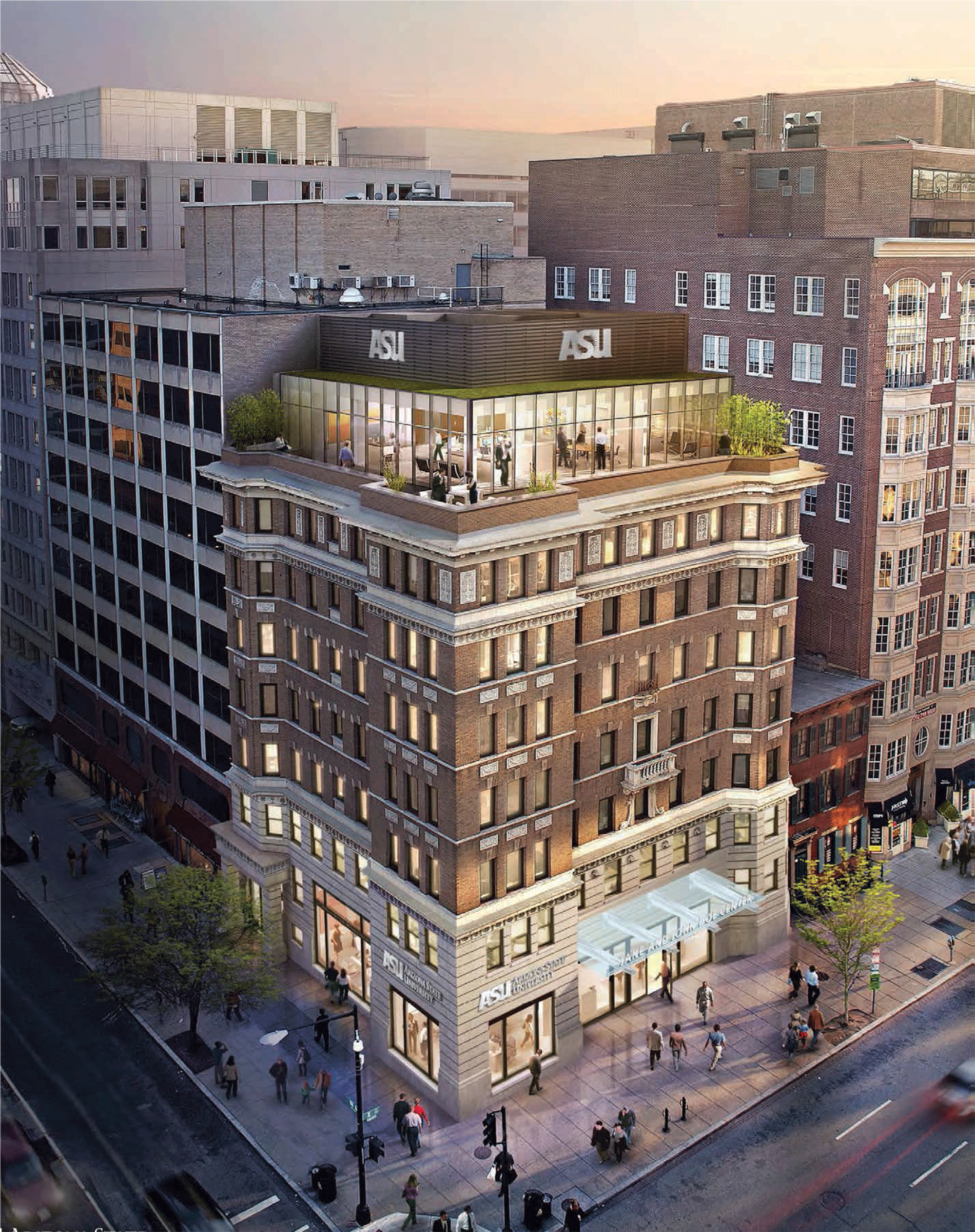Diverse minds to celebrate opening of Barrett & O’Connor Washington Center

Many universities have a presence in Washington, D.C.: a lobbyist, an internship coordinator, or a few folks who hand out swag and try to wrangle money out of federal agencies.
But Arizona State University is a presence in Washington, D.C., a place where top researchers share their insights with leaders who create policy and a catalyst for tangible change in an environment that is often synonymous with partisan dysfunction.
“Our job is not to argue politics, or to argue for this or for that,” Michael M. Crow, ASU’s president, said. “Our job is to talk about the future. The one place you need to be to carry out the conversation, to think about new ideas and to bring everyone together is Washington, because everyone is there from everywhere, all over the United States and all over the world.”
ASU’s presence, though already many years in action, is getting a tangible symbol of its commitment to turning academic research into motion, with the grand opening of the Ambassador Barbara Barrett & Justice Sandra Day O’Connor Washington Center at Arizona State University.
The 32,000-square-foot, eight-story center is in a historic building at 1800 I St. NW, adjacent to the World Bank and two blocks from the White House. The new building, and ASU’s overall work in Washington, will be celebrated with a series of events the week of March 12.
A resource for policymakers
ASU has long hosted students, faculty and staff in Washington, D.C. With the new building, the university will have space to expand the offerings of the initiatives based there, including the McCain Institute for International Leadership, the Walter Cronkite School of Journalism and Mass Communication, Cronkite News/Arizona PBS Washington Bureau, the Academy for Innovative Higher Education Leadership, the Center on the Future of War and the Global Security Initiative, among others.
The McCain Institute convenes prominent politicians and academics from around the world to focus on new models for character-driven global leadership. Through a series of talks, debates and forums, the institute, which identifies itself as a “do tank,” as opposed to a think tank, plays a unique role in the Washington establishment, bringing fresh thinking to seemingly intractable problems.
“Being centered in a cutting-edge, stand-alone building in downtown D.C. concentrates attention from outside the ASU family while bringing together all sorts of possibilities from within — that’s helpful when you want to make waves and impact in Washington with meaning far beyond,” said Luke Knittig, senior director of communications for the McCain Institute.
Also in the building is the Consortium for Science, Policy and Outcomes, which is focused on bridging the gap between academic knowledge and real-world practice by fostering interaction with decision makers and also with the public. The nonprofit think tank was co-founded by Crow and Daniel Sarewitz, the current co-director.
The consortium studies how regular people can play a role in scientific research and technology, according to Mahmud Farooque, the associate director.
“We are trying to move from what is called ‘input-output science policy,’ meaning how much money and postdocs or papers are published, versus what kind of real impact are we having in society for which we’re making this public investment?” he said.
“What it amounts to is engagement with a very long-term goal,” Farooque said. “We’re not looking for a change overnight. We’re talking about how we improve the architecture of our design so we have a long-term positive impact.”
Ambassador Barbara Barrett talks with 13-year-old John Demery at the grand opening of the new home of the Gary K. Herberger Young Scholars Academy on ASU's West campus Oct. 30. The renovation of the new Ambassador Barbara Barrett & Justice Sandra Day O’Connor Washington Center was funded in part by a gift from Barrett and her husband, Craig Barrett. Photo by Charlie Leight/ASU Now
Farooque said that being in Washington, D.C., is a natural fit for the center, which runs a popular series of breakfast seminars.
“One of the challenges with the old building was that we could not host large events,” he said. The additional classroom space will allow more workshops for science and engineering graduate students, called “Science Outside the Lab.”
“We are very excited to be in this location, where the action is,” he said.
The newly renovated building, which will be referred to as the “Barrett & O’Connor Washington Center,” is named after two groundbreaking Arizona women. O’Connor made history in 1981 as the first woman to serve on the U.S. Supreme Court. Barrett, a three-time ASU graduate, was the first female Republican candidate for governor in Arizona and is the former U.S. ambassador to Finland. The center’s renovation was funded in part by a Campaign ASU 2020 gift from Barrett and her husband, Craig Barrett.
Student opportunities
ASU’s base in Washington, D.C., offers unique opportunities for students. Jordan Brunner, a third-year student in the Sandra Day O’Connor College of Law at ASU, is hoping to launch a career in Washington after spending a semester there last year in the International Rule of Law and Security program (formerly known as the Rule of Law and Governance program). He interned at the Brookings Institution, a research think tank, and took classes at night, including a course in which the students learned to function as embassy staff.
“We simulated what it would really be like to give reports, to be ready to understand and respond with the correct information,” said Brunner, who acted as the general counsel. The class presented to State Department employees and got feedback on their performance.
At his Brookings Institution internship, Brunner wrote articles about national-security issues such as climate change and the National Security Agency.
“I worked with people who had been in D.C. a long time and were able to put in perspective what was happening. One of my bosses would say, ‘This is how this operates in real life.’ ”
Brunner said the experience was eye-opening.
“A lot of people think everything in D.C. has to be related to being a Democrat or a Republican, but the skills I learned were not political.”
ASU student journalist Noelle Lilley reported from the Cronkite News Washington, D.C., bureau last summer and got to see the political process up close. Courtesy of Noelle Lilley
ASU senior Noelle Lilley was the only journalist on site when shooting broke out at a baseball practice attended by members of Congress last summer. Lilley, reporting from the Cronkite News Washington, D.C., bureau, was interviewing Arizona Sen. Jeff Flake.
The shooting was dramatic breaking news, but Lilley also got to cover events like the national spelling bee and to see the political process up close.
“It gives you a much clearer perspective,” she said. “People wonder, ‘Why doesn’t Congress just fix this problem?’ But you get to see the intricacies and nuances behind U.S. politics and you don’t know all those things until you’re there to see it.
“Very few students can say they spent their summer interviewing congressmen and sitting in committee hearings.”
The Cronkite News bureau is the only Arizona-based news organization with full-time, year-round coverage in Washington, D.C., according to Chris Callahan, dean of the Walter Cronkite School of Journalism and Mass Communications at ASU.
The students in the bureau cover issues that are important to residents of the Southwest, including border politics and water policy.
“We think it’s critically important that the Cronkite School of Journalism has a major presence in D.C. for the simple fact that Washington, D.C., is the news capital not only of our country, but really of the world,” he said.
“We are trying to be, and we believe we are, the preeminent professional journalism school in the country. Therefore, to have a working news bureau for our students to come from Phoenix and spend a semester immersed in the coverage of Washington issues is critically important not just for their learning, but, we think, for the readers and viewers in Arizona and the Southwest.”
Benefits for all
The students and professionals all benefit from the partnerships in D.C., according to Anne-Marie Slaughter, president and CEO of New America, a think tank and civic-engagement institution that partners with ASU in a number of ways, including through the Center on the Future of War.
“We benefit from being able to teach and have access to tens of thousands of fabulous students,” she said.
“I think for the students, what they get is real-time connection to national security professionals who are doing their job. It's a real-time set of connections that immerses them in what you might think of as lived national security, not just national security in books.”
Placing ASU students and faculty in Washington, D.C., opens the door to a lot of career opportunities, said Sarewitz, of the Consortium for Science, Policy and Outcomes.
“It’s not like medical school, or business school, or engineering school, where there’s a clearly defined career path,” he said. “You have to be creative, you have to be willing to invent your own career.
“One of the reasons there’s fantastic opportunities is there aren’t a lot of people that think the way we think, and people find that very attractive and interesting.”
The nation’s capital is the perfect showcase for the innovative thought leadership fostered by ASU, Slaughter said.
“One of the things I love about partnering with ASU is, there's an atmosphere of what I think of as the presumptive ‘yes,’ ” she said.
“If somebody comes up with an idea, it doesn't automatically happen, but ASU is much more, ‘Well, let's try that,’ than, ‘Why should we do that?’ ”
An artist's rendering shows the 32,000-square-foot, eight-story Barrett & O’Connor Washington Center housed in a historic building at 1800 I St. NW, adjacent to the World Bank and two blocks from the White House.
Barrett and O’Connor Washington Center launch
ASU Now will be covering the events celebrating the opening of the Ambassador Barbara Barrett & Justice Sandra Day O’Connor Washington Center at Arizona State University. Check in at asunow.asu.edu for blog updates; some panels will also be available via Facebook Live at facebook.com/arizonastateuniversity. To register to attend events in person, visit washingtondc.asu.edu/center-launch.
Monday, March 12
8–10 a.m.: “Future of War and U.S. National Security” panel discussion sponsored by the Center on the Future of War, highlighting core faculty: Peter Bergen and Daniel Rothenberg, co-directors, and Lt. Gen. (ret.) Bob Schmidle and Candace Rondeaux, senior fellows.
11:30 a.m.–1 p.m.: “Crisis in Higher Education? Free Speech, Intellectual Diversity and Civil Dialogue on Campus” panel discussion sponsored by the School of Civic and Economic Thought and Leadership.
3:30–5 p.m.: “Exploring the Cronkite School” sessions that will include information about the Walter Cronkite School of Journalism and Mass Communication’s award-winning professional programs in Phoenix, Los Angeles and Washington as well as a tour of the Cronkite News – Washington Bureau. Mark Lodato, associate dean of the Cronkite School, will moderate a panel featuring Washington Post reporter Samantha Pell; Lisa Ruhl, senior video producer at The Hill; and Marisela Ramirez, media intern at Edelman Public Relations.
6–7 p.m.: “Covering Washington in the Age of Trump” keynote panel, sponsored by the Walter Cronkite School of Journalism and Mass Communication, featuring Leonard Downie Jr., the Weil Family Professor of Journalism at the school and former executive editor of the Washington Post.
7–7:15 p.m.: Tour of the Barrett and O’Connor Washington Center and Cronkite News Bureau.
7:15–8:30 p.m.: Cronkite School reception.
Tuesday, March 13
8–10 a.m.: “The Importance of University Researchers Partnering with Mission Focused Government Agenda” panel discussion sponsored by the Ira A. Fulton Schools of Engineering, moderated by Nadya Bliss, director of ASU’s Global Security Initiative.
11:30 a.m.–1:30 p.m.: “How Will Self-Driving Cars Reshape Our Cities?” panel discussion sponsored by Future Tense, a partnership between Slate, New America and ASU.
4–7:30 p.m.: Knowledge Enterprise Development showcase and reception. This is an opportunity to explore research prototypes and mingle with some of the top research thought leaders of the future from ASU.
Wednesday, March 14
8–10 a.m.: “Transformative Knowledge by Design: Graduate Student and Postdoctoral Fellows’ Research Impact” panel discussion sponsored by the Graduate College in partnership with the Council of Graduate Schools.
11:30 a.m.–2 p.m.: “Restoring Trust in American Policing” panel discussion sponsored by the College of Public Service and Community Solutions featuring Cassia Spohn, professor and director of the School of Criminology and Criminal Justice.
6-8 p.m.: “Expanded Opportunities through ASU’s International Rule of Law and Security Program” panel sponsored by the Sandra Day O’Connor College of Law moderated by former U.S. Ambassador-at-Large for War Crimes Issues and Distinguished Professor of Practice Clint Williamson.
Thursday, March 15
11:30 a.m.–1:30 p.m.: “Communities in a Transborder World” film and photography presentation by the School of Transborder Studies at ASU, showcasing the community-embedded research of students.
6–6:45 p.m.: Reception for alumni of the Thunderbird School of Global Management.
7:15-8:45 p.m.: “Globalism in the Age of Nationalism” discussion sponsored by Thunderbird School of Global Management featuring Allen J. Morrison, CEO and Director General of the Thunderbird School, and panelists.
Friday, March 16
8–10 a.m.: “For the Win: Innovative Approaches to Athlete Education” panel discussion sponsored by the Global Sport Institute at ASU.
11:30 a.m.–3:30 p.m.: “How the Public Can Inform Science and Technology Policy: The Case of Planetary Defense,” sponsored by the School for the Future of Innovation in Society; the Consortium for Science, Policy and Outcomes; the School of Earth and Space Exploration, and the Museum of Science.
1–5 p.m.: “Redesign School: The Future of Design Education” roundtable, sponsored by the Design School in the Herberger Institute for Design and the Arts in partnership with the National Building Museum.
5–6:30 p.m.: Arts and Design at ASU reception with The Design School in the Herberger Institute for Design and the Arts, in partnership with the National Building Museum.
Monday, March 19
5–7 p.m.: “The McCain Institute at ASU: How Do We End Terrorism?” discussion from the McCain Institute for International Leadership. Executive Director Kurt Volker will host former Homeland Security Adviser (and McCain Institute trustee) Fran Townsend, former Director of the U.S. National Counter-Terrorism Center Nick Rasmussen and special guests as they describe the evolution of global terrorism since 9/11 and discuss long-term approaches for overcoming it.
Tuesday, March 20
5:30–7 p.m.: Center for Gender Equity in Science and Technology reception, convening leading African-American women in STEM and providing a forum for women to strategize and build coalitions, continue discourse from previous gatherings that have led to grant funded projects, share job announcements and explore opportunities to support and lead interagency functions.
Learn more about ASU in Washington, D.C., at washingtondc.asu.edu.
More Law, journalism and politics
Can elections results be counted quickly yet reliably?
Election results that are released as quickly as the public demands but are reliable enough to earn wide acceptance may not always be possible.At least that's what a bipartisan panel of elections…
Spring break trip to Hawaiʻi provides insight into Indigenous law
A group of Arizona State University law students spent a week in Hawaiʻi for spring break. And while they did take in some of the sites, sounds and tastes of the tropical destination, the trip…

LA journalists and officials gather to connect and salute fire coverage
Recognition of Los Angeles-area media coverage of the region’s January wildfires was the primary message as hundreds gathered at ASU California Center Broadway for an annual convening of journalists…




